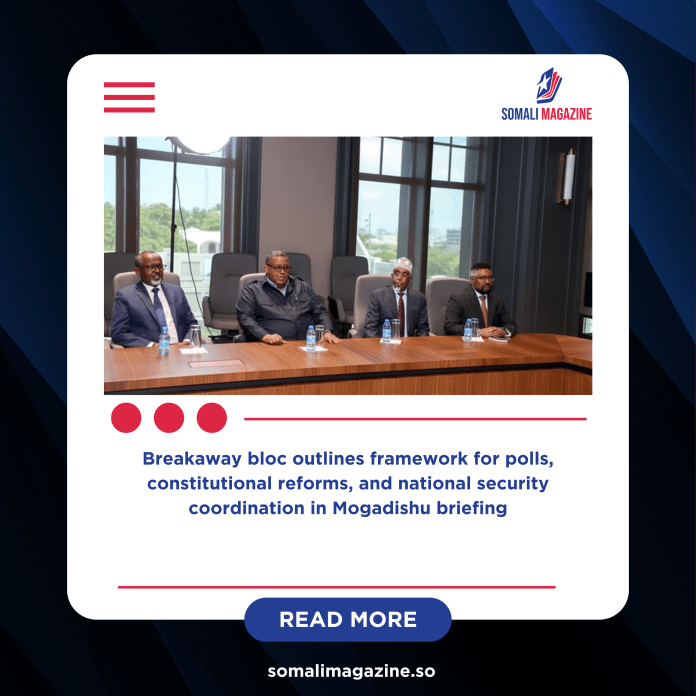Facebook Twitter (X) Instagram Somali Magazine - People's Magazine
A group of Somali opposition leaders who recently broke away from the Somali Salvation Forum have taken a major step toward shaping the country’s political future. On Monday, they signed a framework agreement with the federal government that sets out how Somalia’s next elections will be conducted.
The agreement is based on the 2024 electoral law, which provides rules for how different levels of government will function and how elections will take place. According to the deal, the Federal Parliament will be responsible for electing the president. Once elected, the president will have the power to appoint a prime minister, but this choice must be approved by the House of the People. Parliament also reserves the right to withdraw confidence from the prime minister if needed.
At the state level, regional legislatures will choose their own leaders and deputies. The framework also introduces a rule meant to strengthen Somalia’s multi-party democracy: any political group that secures at least 10% of seats in the Federal Parliament will officially be recognized as a national party.
Both sides to the agreement emphasized that this deal is not only about elections but also about reinforcing Somalia’s state-building process. They pledged to speed up preparations for local, state, and federal elections and to complete the remaining sections of Somalia’s provisional constitution, which has been in draft form for years. Finalizing the constitution would provide the country with greater legal clarity and stability.
Another key part of the agreement is security. The leaders promised to support ongoing national security operations aimed at reclaiming territories still controlled by the extremist group al-Shabab. By aligning their political and security priorities, both the government and opposition bloc hope to send a message of unity at a time when Somalia faces both political and security challenges.
On Tuesday, the newly formed bloc of opposition leaders will brief international envoys in Mogadishu. Officials familiar with the plan said the meeting will cover immediate steps to implement the deal, including setting a timetable for preparations and mapping out the electoral calendar. The leaders are also expected to announce their intention to register a new political party that can compete in future elections under the new framework.
The bloc bringing this initiative forward includes several well-known political figures in Somalia. Among them are former Prime Minister Omar Abdirashid Ali Sharmarke, former Speakers of Parliament Sharif Hassan Sheikh Adan and Mohamed Mursal, and former Information Minister Dahir Mohamud Gelle. Their participation signals the seriousness of the effort and reflects a shift in Somalia’s political landscape, as these seasoned leaders commit to working with the federal government instead of staying with the Salvation Forum.
Meanwhile, the faction of the Somali Salvation Forum that did not join the agreement has yet to issue an official response. Organizers of Tuesday’s briefing say they will use the opportunity to build wider support for the deal and encourage more political actors to join the process.
The communiqué signed on Monday also stressed Somalia’s sovereignty and national unity, reminding both domestic and international partners that the country is determined to move toward a stable, democratic system. For many Somalis, the agreement is seen as a chance to finally put in place a framework that can lead to one-person, one-vote elections—something long promised but difficult to achieve due to political disagreements, security concerns, and logistical challenges.
Looking ahead, the success of the deal depends on how quickly and effectively it can be translated into action. Officials acknowledged that turning the agreement into real procedures will require clear guidelines, adequate funding, and strong coordination between different levels of government. Creating an electoral calendar and ensuring resources are in place will be essential steps in the months ahead.
If implemented properly, this agreement could mark a turning point for Somalia. By bringing together government leaders and key opposition figures under a shared framework, it opens the door to greater political cooperation, stronger institutions, and progress toward long-awaited democratic reforms.

